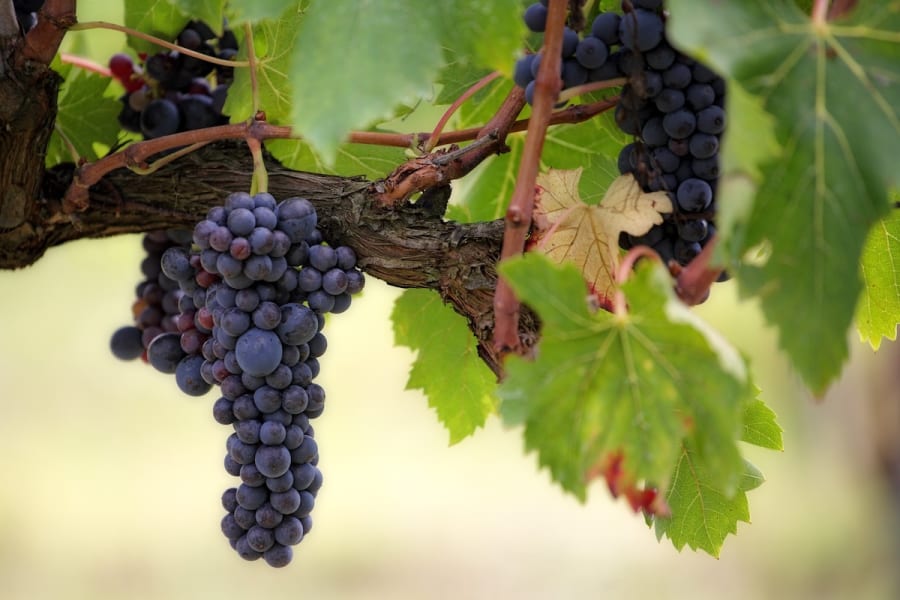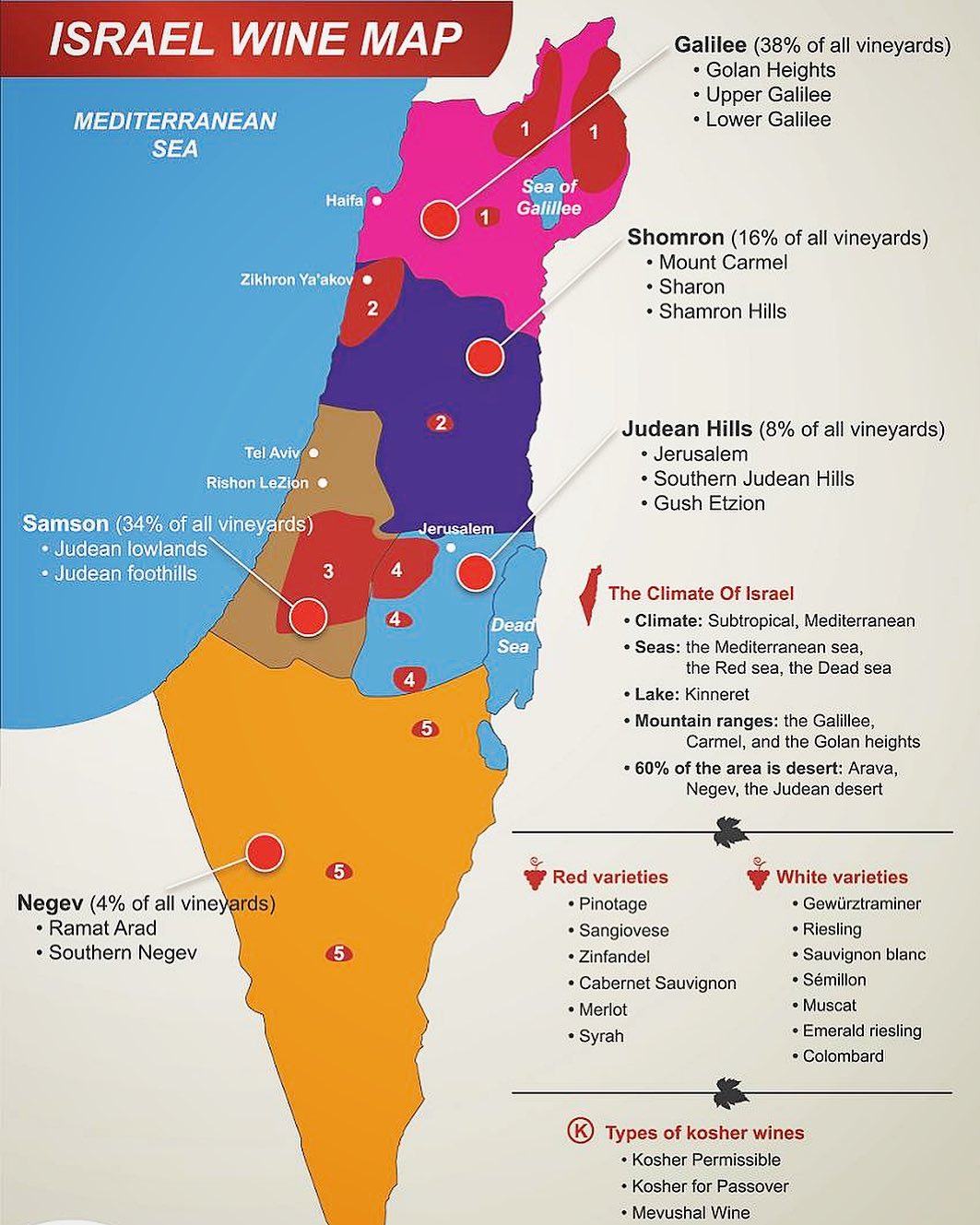From the Land to the bottle: The Israeli vine is a heritage rich in meaning

Since ancient times, Israel's history and culture have been shaped by the abundant presence of the vine, both in its agricultural production and in its symbolism, widely mentioned in biblical texts.
Let's discover how the vine reveals its richness as a resource and heritage proudly preserved in Israel, and why, primarily in its winemaking form, it remains an essential part of Jewish celebrations.
The vine is the third of the seven main species mentioned in the Promised Land (Deut.8):
Contemporary scientists have demonstrated that grapes are a good source of fiber, potassium, and a range of vitamins and other minerals. Antioxidants and other key nutrients in grapes, such as resveratrol, make them a particularly healthy choice and offer a number of possible benefits, associated with the prevention of cancer, heart disease, high blood pressure and digestive diseases.
Were you aware that cultivated vine plants have the remarkable ability to reach ages of 100 years or more? What a symbol of longevity!
Grape juice, whether natural or fermented, along with "wheat, wine and oil" (Deut 28:51), is one of the main beverages produced in the land of Israel!

From the earliest biblical times:
The Bible has numerous variations of the words used to describe the vine and its components, underlining the importance of viticulture to the agriculture and economy of the land of Israel during the biblical period:
· Vine gèfèn (גפן) - used 55 times
· Branch zmôrâh (זמרה) (Isa 17:10) et soûr (סור) - used 5times
· Branch, sârîghv (שריג)(Gen 40:10,12, Joel 1:7) - used 3 times
· Cluster, echkôl (אשכל) (De 32:32, Isa 65:8, Mic 7:1) - used 9 times
· Grape, énâb (ענב) (Gen 49:11, Lev 25:5, Num 13:20 23, Neh 13:15, Hos 3:1 9:10, Am 9:13) - used 19 times
· Wild grapes, beouchim (באשים) (Isa 5:2,4) - used 2 times
· Vineyard, kèrem (כרם) which appears clearly in the word karmel = vineyard of God (Gen 9:20) - used 92 times
The vine appears in the very first pages of the Bible: after the flood, Noah begins to cultivate it (Gen 9:20), Abraham finds it in Canaan (Gen 14:18). Joseph found it in Egypt (Gen 40:9, Ps 78:47), and the Hebrews found it in Canaan, describing the fabulous bunch of grapes that the explorers picked at Eshkol (=grape) and brought back suspended from a pole (Num 13:23).

The consumption of fresh grapes is also mentioned, as well as raisins (Num 6:3), which were prepared in large quantities by immersing the bunches in a potash solution before drying them; they were then made into cakes (1 Sam 25:18 30:12, 2Sam 16:1,1 Chr 12:40).
In biblical language, the vine/wine illustrates, among others, God's blessing as:
- a symbol of peace (Mic 3:3-4, Zec 3:10)
- a symbol of fertility (Ps 128:3)
- a living fruit that God expects in the life and conduct of the people of Israel (Ez.15:1-5, Is.5:2-5).
Jesus spoke of the vine in five parables and compared Himself to the Vine on which the branches (His disciples) depend:
In the New Testament, wine symbolizes the abundance of grace and the joy of salvation, as was seen at the wedding in Cana where Jesus/Yeshua performed His first miracle of turning water into wine, showing the abundance and the transformation of the ordinary into the extraordinary. (John 2:1-11)
In John 15:5, the image of a branch gaining all its sustenance and strength from the parent vine is a beautiful description of man's total dependence upon God, without Whom we can do nothing, for in Him we live and move and have our being.
As a reminder of ultimate sacrifice and love for humanity, Jesus/Yeshua shared the wine during the Passover meal and Last Supper with His disciples, representing the blood of the New Covenant (Luke 22.1-23).
The night before the Israelites left Egypt, on Pesach, just as they applied the blood of the lamb on the doorpost, His blood covers us and delivers us from eternal death.
Meanwhile, Jews across the globe are preparing to celebrate Passover (Pesach):
As the Feast of Pesach approaches, Jewish families will need to decide which wines to fill the four ceremonial seder cups to accompany the special meal that will be served.
Of all the Jewish feasts, Pesach is undoubtedly the oldest – and the one that goes far beyond biblical ordinance – as an experience first and foremost deeply lived and to be lived.
For 3,500 years, the people of Israel have commemorated their liberation from Egypt and the slavery of Jacob's entire family which, in just a few centuries, has become countless people.
More than just a family tradition, Pesach is the story of a redemption that God himself won for His people.
The four cups of wine that are consumed at the traditional Pesach Seder have profound and varied meanings:
· The four expressions of deliverance used by God in the Torah to describe the liberation of the Israelites from Egypt: "I will bring you out"; "I will save you"; "I will set you free"; and "I will take you."
· The liberation of the Israelites from Pharaoh's four oppressive decrees, including slavery and the murder of the Hebrew firstborn.
A wine is considered kosher for Pesach when it complies with specific rules of preparation and ingredients, in accordance with Jewish laws.
Here are the key points:
- It must be handled exclusively by Shabbat-observant Jews, from the moment the grapes are harvested through to bottling;
- All of the ingredients used, including clarifying agents, must be kosher.
- The wine must also be chametz-free, it must not contain any fermented grain products that are forbidden during the holiday (wheat, barley, oats, spelt, rye)
- The wine must be certified by a competent rabbinical authority, guaranteeing that it meets all of these specific Pesach requirements.
No matter where the Pesach Seder is held worldwide, Israeli wines are usually selected. It's a way of marking one's attachment to the Holy Land which, in essence, is the ultimate goal of the story every year.
Viticulture in Israel: From ancient traditions to modern industry:
Ever since its production began in ancient Israel, wine has been exported to other nations. The pharaohs of Egypt favored Canaanite wine in the Bronze Age, and when the Egyptians ruled the region, certain taxes were even paid in the form of wine.
Ancient Israel had a thriving wine industry as evidenced by excavations of wine presses and buried storage vessels, and it reached its peak during the Second Temple period. The Roman destruction of the Temple led to the dispersion of the nation's Jews, and the once-proud wine industry was abandoned. After the fall of the Temple, the Arab conquest from 600 A.D. and the Islamic ban on alcohol led to the uprooting of many remaining vineyards across the country, particularly in Judea and Samaria.

But hope was not lost for those who wished to return and plant vines on the hills of their ancestors. A call to return emerged in the hearts of many Jews, who began settling in and among their Arab neighbors in the mid-19th century. From the time of Ottoman rule until then, the region's grapes were grown exclusively for consumption.
The revival of winemaking in Israel began in the mid-1800s and developed into a full-fledged industry by the end of the 1880s. It began as a "cottage industry", making wine at home to provide Kiddush (sacramental) wine for the Jewish religious community or communion and altar wine for Christian pilgrims in search of "Holy Land wine". The first recorded evidence of this was in Jerusalem's Old City, when the Shor family began producing wine there in 1848.
The first Jewish agricultural settlements of Rishon Lezion and Zichron Yaacov in the late 19th century chose grape-growing and winemaking as their main industry.
Baron Edmond de Rothschild, a French Jewish philanthropist, and owner of Château Lafite in Bordeaux, sent his experts to initiate viticulture. Since 1882, he offered support and sponsored the planting of vineyards.
These pioneers have persevered in developing different techniques – and adapted to different soils and climatic constraints – to expand production throughout Israel.
Reflecting on the diversity of the people of Israel, the winegrowers and grape varieties cultivated on the territory are numerous, distinct and rich:

Over the past decade, Israel's wine exports have doubled.
During the Second World War, the viticulture and wine industries began to increase again. When the State of Israel was established in 1948, there were 14 wineries. Today, over 300 wineries can be visited throughout the country, including 70 that harvest 50 tons of grapes or more per year - just over half of which are considered kosher.
One of the wineries located in the Judean Hills, nestled in the heart of the Messianic moshav of Yad Hashmona, Domaine du Castel – founded by the courageous autodidact Eli Ben Zaken more than 30 years ago – is an impressive model of rebirth from the old to the new, as described in their brochure: « Now we have the opportunity to return to our roots and do something new ».

Resisting time and various challenges, the promising Israeli vine has managed to make a name for itself on the international scene, reminding us of the timelessness of wine which "rejoices the heart of man" (Psalms 104:15).

The All Israel News Staff is a team of journalists in Israel.














